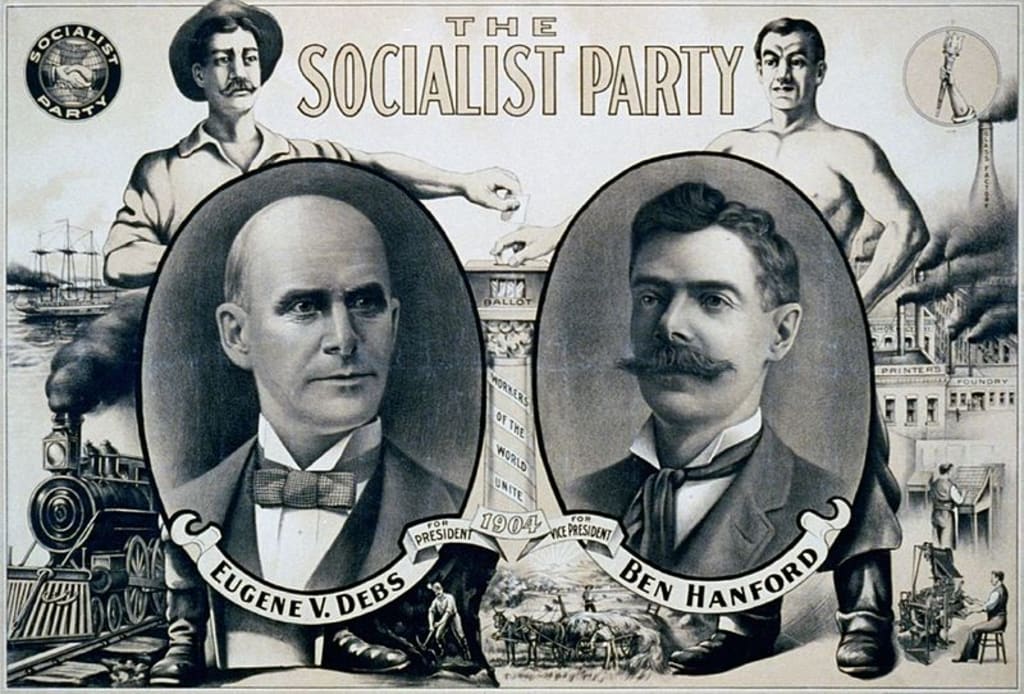
The political binary of American politics has been irreversibly changed. The conservative faction (Republicans) have embraced borderline fascist tendencies, rampant campaigns of misinformation and outright xenophobic contempt while the Democrats masquerade their contempt for the working classes under identity politics. Both sides have been bought and sold by the capitalist elite. Essentially this turns politics into a rich man's game. The laboring classes both lower and middle have become pawns in a political chessboard. We only exist to serve and consume what the capitalist class produces.
The buzzword of the past decade has been socialism. Senator Bernie Sanders of Vermont made it trendy during his two presidential runs and the Democratic Socialists of America have endorsed candidates nationwide in order to build a progressive/leftist coalition in Congress. There is a population of Americans looking for substantive political and economic changes through Socialism. Before I get into how we achieve a socialist society we must examine briefly the theoretical frameworks of capitalism and socialism.
Adam Smith discussed the formation of Capitalism in The Wealth of Nations. As the natural successor to the mercantile system that dominated much of imperial Europe for much of the 17th and 18th centuries the growth of industry allowed the rise of a middle merchant class. It was this new wealth that would generate the growth of factories and industries that would allow for imperial expansion in the 19th century and led to the conditions which Marx and Engels discuss in the Communist Manifesto. Capitalism is the aggregation of material and financial resources to create innovation and fund discovery. Many great technological innovations and scientific discoveries were used to advance the progress of humanity. However this also led to rampant expansion which culminated in the subjugation of indigenous peoples, the destruction of the environment and the rapid growth of cities which were disease ridden and full of human suffering.
In the most ideal circumstances the gains made under capitalism would be used to create a modern progressive society where all profits are equally distributed to the labor necessary to create it. However, the aggregation of financial resources in the hands of a minority of individuals allows for total control of the supply and the demand. The old saying "Money Talks" is an adequate summation of the dangers of capitalist excess. It was this excess that led Theodore Roosevelt to create anti-trust and anti-monopoly laws in response to companies like Standard Oil and Carnegie Steel controlling the supply and demand. Yet, the unfortunate part of all this is that the companies will find way to skirt these laws to ensure maximum control of every facet of production.
The problems we see under capitalism are not new issues. Housing Scarcity, Poverty, Environmental Destruction, Addiction and Health Crises are all products of capitalisms exploitative nature. The individuals, companies or groups who control the wealth have all the power to dictate supply. Anyone with basic economic common sense would understand that investing any surplus revenue (profit) into the labor force is the best way to ensure that the cycle of revenue generation continues consistently or increases. However we have seen that companies outright refuse to pay workers the fair value of their skills and labor or provide them with benefits and access to resources like health care to reduce their cost of living. Working class people are exploited until they are no longer of use or value to the people in charge. "Life is cheap" is a cynical summation of how capitalism infiltrates our lives and exploits us without remorse.
Marxism is the foundational theory of all socialist thought and practice. Marx and Engels wrote the Communist Manifesto during a time of great social upheaval in European history. They saw the rise of the factory system, the growth of industrial exploitation and the rapid expansion of imperial powers across the globe. One of the foundational theories of Marxism is the labor theory of value. The labor theory of value is the theory that the value of a good or service is proportional to the amount of labor that is needed to produce a good or service. Many workers do not realize that they hold the keys to power due to the state of servitude in which they work to ensure their survival.
How can we bring conversations about Socialism into American politics without all the vitriolic antagonism from liberals and conservatives? Many Americans realize that the market has failed them. That the mechanical growth of the profit driven machine has ground labor into dust. Strikes and Union organizing are highlighting the gross inequity people are facing and many people are feeling hopeless in the face of the economic hurdles that have been placed before them. This is the time to begin a push for a broader set of Socialist/Communist reforms. Conversations around Socialism/Communism are not new. In the early 20th century the Socialist Part of America was discussing ideas on how
Before Bernie Sanders, there was Eugene V. Debs and the Socialist Party of America. Debs was an active union member and labor organizer and an active campaigner for labor rights, women's rights, children's rights and social justice. Socialists today can look to Debs' as an example of what can be done if labor comes together to organize and cripple the capitalist machinery. Those in power, who have the keys to power they rightfully fear an educated and organized working class.
Every movement starts off as an idea that grows into a call to action. In the past ten years we have seen collective organizing on a nationwide scale. For Socialism to truly have a resurgence in America the working class must not capitulate to Capitalist sabotage and continue to unionize and realize the value of their labor. "The only thing we have to lose is our chains."
About the Creator
Ronin
My name is Ronin. I am from New York City. I love writing and am passionate about a diverse array of subjects. My topics of focus are politics, popular culture, science and philosophy.






Comments
There are no comments for this story
Be the first to respond and start the conversation.